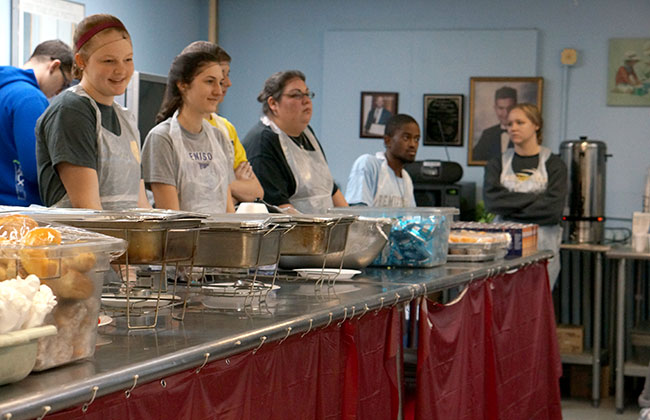A Michigan church partnered with area public high schools to empower students in the fight against injustice. Along the way, they also learned a bit about what it means to be a family.
The church’s plan was simple: a justice-based spring break service trip to Staten Island, New York, led by their youth pastor.
The method was unexpected: start by recruiting at area public schools, and then, later, promote the trip within the church.
“The goal of the trip was to empower students, those with and without faith, to get in the fight against injustice,” says Jordan Stonehouse, next gen director at Fair Haven Church (RCA) in Hudsonville, Michigan. “I firmly believe that all students desire to make a difference and get their hands dirty doing it.”
Stonehouse led a group of high school students to New York last April to work with Project Hospitality. An RCA mission partner, Project Hospitality is a nonprofit organization that seeks to advocate for people in need and rehabilitate communities. Before the trip, Stonehouse worked with two area public school superintendents to promote the trip within their high schools, and was granted the opportunity to present the trip to both schools’ student councils.
The result? Eleven students signed up—three of whom had never attended Fair Haven’s youth group. Thus, the trip became just as much about creating a family within the group from Michigan as it was about ministering to the people of New York.
“To start this trip with mostly all of us being complete strangers, knowing that the only similarity between us was our love to serve others, was an incredible thought,” says Alexandria Kapla, a junior at Jenison High School who attends a church near Fair Haven. “We were all there to serve, in any way possible. We not only did that, but we built friendships that will last a lifetime.”
Stonehouse was careful to promote the trip as a non-faith-based experience, given his audience. “We honored our promise not to proselytize or enforce prayer, but students brought the subject of God up in our nightly ‘family time,’ where we processed our experience together,” he says. “I saw God in my peripheral vision—he brought himself up through students’ interactions with the patrons of Project Hospitality, and in relationship to each other.”
In New York, the students spent time at Project Hospitality’s food pantry, helping patrons “shop” for their food and organizing incoming donations. They were able to attend training sessions on the realities of homelessness and drug abuse, and took part in the organization’s weekly dinner for individuals with AIDS and HIV. The group also spent a few days cleaning up the property and parsonage of a local church that had been hit hard by Hurricane Sandy.
In the evenings, during that nightly family time, Stonehouse saw the impact the service was having on the students. For the week, the group chose to live off of the same food supply that Project Hospitality would provide to a family of their size. If students purchased food on the side or ate any food they had brought with them, that was considered “stealing.” Stonehouse wanted the group to focus on their shared experiences and be able to grow in relationships together.
“The close living quarters, shared camaraderie over living off of the pantry [food], and serving during the days and nights really drew our group close together,” he says. “Especially when a group member would get discouraged, we would hold each other accountable by asking, ‘Are we still family?’ The phrase implied that we were in this journey together, as a family for the week.”
Even now, months later, those eleven “family members” still use the phrase to encourage each other—by text message, at church, or when passing each other in school hallways.
“‘Are we still a family?’ serves as a reminder to never forget all the different people from all walks of life that we met and served,” says Kapla, “and also to love one another—every person you meet—like family.
“The trip had a tremendous impact on the way I think and interact with people daily.”
Stonehouse echoes those thoughts: “It was amazing—the sense of unity that our group had with each other…I believe that those students see the world differently now. They cannot see people as walking stereotypes, but [instead] as valued and unique. And for those with a strong faith background, they can finally see the image of God within the poor and homeless.”
Stonehouse is currently planning the next spring break trip, and plans to take the same approach to recruiting students.
“As a church, we want to befriend as many nonbelievers as we can, in hopes of having gospel impact. And it’s more fun to have people who challenge and expand our thinking! Growth often comes through doubts, re-examination, and prayer—partnering with the public schools provides an excellent opportunity for that.”
Get a scholarship to help your youth group take a trip like this. Visit www.rca.org/nextgenfund.
Want ideas for other places to serve? Browse available trips at www.rca.org/volunteers.
Brainstorm ways your church could invite other people on a volunteer trip.





